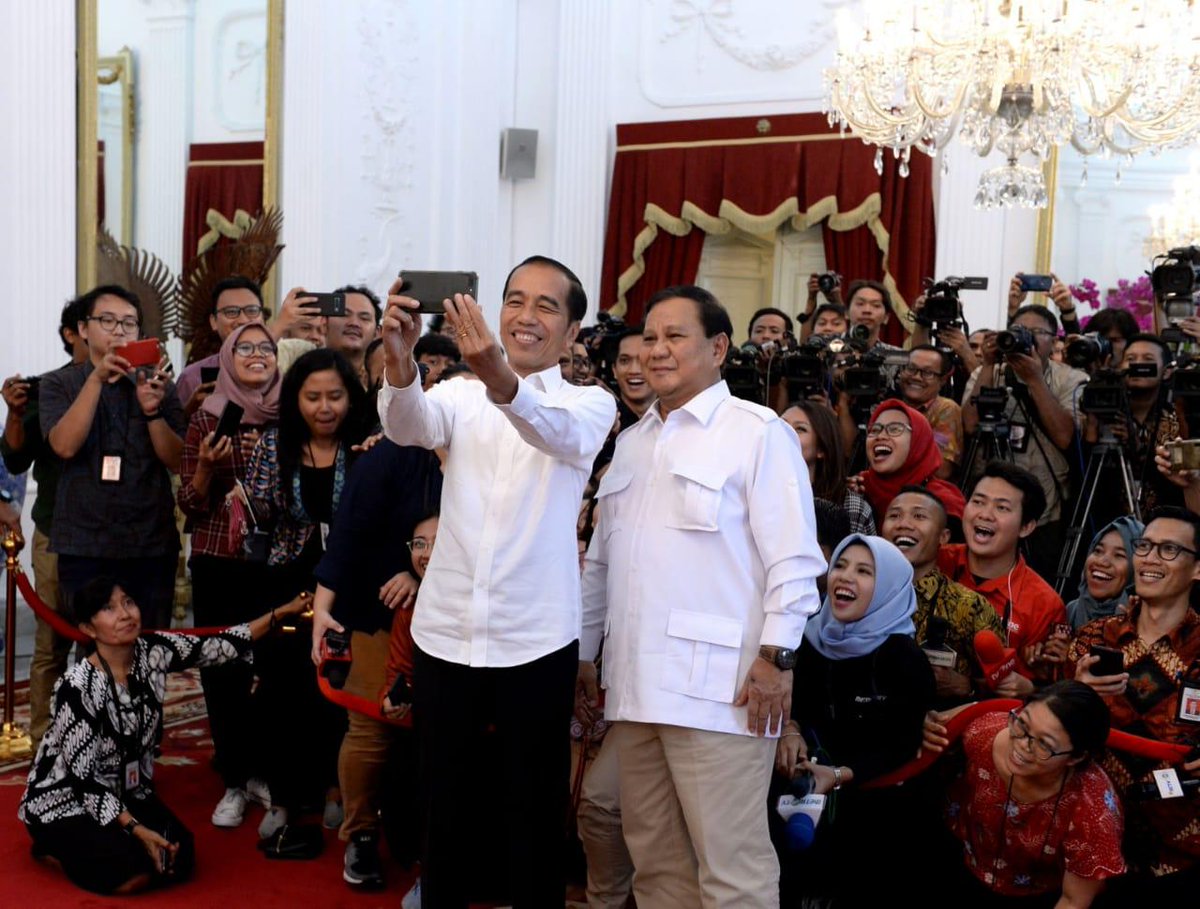Prabowo’s return will challenge Indonesia’s defence establishment
Posted By Greta Nabbs-Keller on October 29, 2019 @ 15:15

President Joko (Jokowi) Widodo’s inclusion of defeated presidential rival and Greater Indonesia Party (Gerindra) leader Prabowo Subianto in his cabinet appears to validate analysis [1] pointing to a more authoritarian turn in Indonesia and the resurgence of the country’s oligarchic elites.
Certainly, the appointments of Prabowo as minister of defence and his senior party colleague, Edhy Prabowo, as minister of maritime affairs and fisheries integrate Gerindra firmly into the ruling coalition, effectively ending any substantive political opposition. However, the appointments also carry with them the risk of intra-service rivalries and bureaucratic tensions in Indonesia’s broader security and strategic policy apparatus.
Prabowo’s appointment as defence minister raises the prospect of strained relations between Indonesia’s defence ministry (Kemhan) and Indonesian Armed Forces Headquarters (Markas TNI). In Indonesia, both the TNI commander and the defence minister are cabinet members. The TNI commander serves in an ex officio capacity alongside the chief of the Indonesian National Police and reports directly to the president. The defence minister reports through the coordinating minister for political, legal and security affairs (Menkopolhukam).
With the dismantling of Indonesia’s powerful security–intelligence apparatus following the end of the Suharto regime, Kemhan was vested with authority over defence policy, strategy and budgetary issues. It has been considered less powerful than Markas TNI, which retained authority over military personnel, operations and equipment. Command responsibilities [2] at Markas TNI are vested in four-star army, air force and navy service chiefs under a TNI commander, currently Jokowi loyalist Air Chief Marshal Hadi Tjahjanto.
Although Prabowo’s appointment doesn’t give him command authority over soldiers, he has previously commanded army special forces and for a short time led Indonesia’s Strategic Reserve Command (Kostrad). Prabowo is also the former son-in-law of the late president Suharto. In 1998, after his surprise call at the presidential palace with troops, Prabowo was stripped of his Kostrad command by the then TNI commander, General Wiranto, on the request of newly sworn-in President Bacharuddin Jusuf Habibie.
During the tumultuous years of Indonesia’s reformasi process from 1998 to 2004, independent chains of command (komando di dalam komando) posed a serious challenge for TNI professionalism. Human rights abuses, including extra-judicial killings in Papua, Aceh, East Timor and Jakarta, were allegedly ordered by both former and serving TNI officers outside formal command structures.
The emotional pull of officer corps linkages remains strong in Indonesia. The influence of enduring allegiances to Prabowo were evident in police investigations [3] of a number of Prabowo’s former subordinates for reported links to the deadly May riots outside the Constitutional Court and rumoured coup plans.
Prabowo is not known for his deference to more senior military officers or indeed civilian executive officials. Given his forceful personality and command-style leadership, Prabowo’s ability to work harmoniously with Tjahjanto may be in question.
Furthermore, Prabowo’s ardent nationalism and fundamental belief in robust defence capabilities to protect Indonesia’s sovereignty and territorial integrity may see him assume greater control over the direction of Indonesia’s strategic policy, potentially creating friction not just with TNI command, but also with Indonesia’s foreign ministry (Kemlu).
Kemlu is committed to maintaining an inclusive, rules-based order, and sees ASEAN centrality as the key to managing the regional distribution of power amid escalating geopolitical tensions. Any lack of rhetorical discipline or unilateral decision-making by Prabowo that affects Indonesia’s relationships with China, the US, Japan, Australia and fellow ASEAN states could create headaches for reappointed foreign minister Retno Marsudi.
In the 2014 presidential debates, Prabowo’s discussion of the threat posed by China to ASEAN states’ maritime territorial integrity illustrated both his superior grasp of regional strategic issues and his willingness to call out China’s coercive behaviour.
Prabowo has also been critical of the use of Chinese labour and Beijing’s investment in Indonesia. His willingness to team with hardline Islamic groups that are deeply anti-Chinese in disposition was evident in the 2017 Jakarta gubernatorial elections and the 2019 presidential contests.
How Prabowo relates with new cabinet colleagues, such as former Constitutional Court chief Mohammad Mahfud MD, who has been appointed to the powerful role of coordinating minister for political, legal, and security affairs remains key. The former incumbent, Wiranto, drew on his extensive military command experience to manage destabilising political forces for Jokowi, albeit not without criticism [4]. Mafud is the first civilian appointee to this portfolio and will need to exert his authority over Indonesia’s national security apparatus.
Jokowi’s inclusion of Prabowo in the cabinet was undoubtedly inspired by a number of factors, including a desire to achieve an integrated political coalition with Gerindra. Having Prabowo in the cabinet may well defuse the risk of further political instability, but it will not guarantee policy coherence across key strategic and security portfolios or unity within TNI.
There’s no doubt that Prabowo has extensive experience in defence matters, but the practical requirement to build consensus on key policy issues and maintain cabinet unity for effective governance may prove more elusive in Jokowi’s second term.
Article printed from The Strategist: https://www.aspistrategist.org.au
URL to article: https://www.aspistrategist.org.au/prabowos-return-will-challenge-indonesias-defence-establishment/
URLs in this post:
[1] analysis: https://www.tandfonline.com/doi/full/10.1080/00074918.2018.1549918
[2] Command responsibilities: https://www.bloomberg.com/news/articles/2018-02-14/jokowi-cements-ties-with-indonesia-military-in-political-shift
[3] police investigations: https://nasional.tempo.co/read/1213973/riwayat-eks-tim-mawar-ada-yang-jadi-jenderal-hingga-berpolitik
[4] not without criticism: https://www.tribunnews.com/nasional/2019/05/17/soal-makar-wiranto-kalau-tak-mau-berurusan-dengan-polisi-jangan-ngomong-macam-macam
Click here to print.